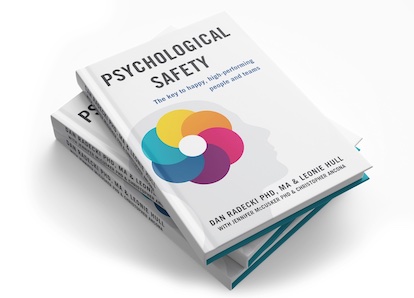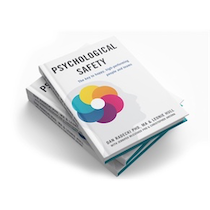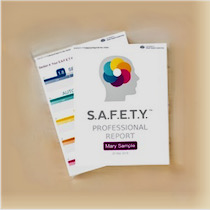As we reflect on 2023, a few trends emerged from our clients and collaborators that will likely continue to grow as areas of focus in 2024. Psychological safety clearly stands out as a phenomenon that teams and organizations are trying to tackle in gaining a deeper understanding of what it truly is, its impact on health, wellness and performance – how to manage it.
A sense of urgency to understand psychological safety was evident in 2023, and will be even more so in 2024, largely based upon recent guidance from the International Organization for Standardization (ISO). Their most recent standard (ISO 45003) involves mental health in the workplace and specifically calls out psychological safety and health as a responsibility of employers and lays out specific guidelines to manage psychosocial risks (learn more). A key aspect of this guidance is that psychological safety isn’t simply the responsibility of a leader, but rather that all employees need to take accountability for proactively managing their own psychological safety. This just makes sense when we consider what it takes to implement change in our behavior. Having accountability and ownership for our own behavioral changes leads to a better chance of actually making those changes “stick” and become habits, so making employees accountable for their own psychological safety is a must. It would be similar to starting a diet but expecting your weight loss to be the responsibility of your personal trainer! Needless to say, in our experience, this is critical, in our experience individual involvement is critical, as employee or team psychological well-being cannot be the sole duty of a leader.
Another key takeaway from the ISO 45003 is the need to have accountability and reinforcement to truly build and maintain psychological safety on a team. This means simply creating education and awareness of the need for psychological safety won’t suffice. Individuals need to make a commitment to maintaining this safety for themselves and others, while leaders and organizations need to have sufficient tools, metrics and processes in place to proactively monitor and manage psychological safety.
This also seems to be an area of unmet need within the team psychological safety space, and that’s where ABL provided support in 2023, in the form of a validated assessment, leader toolkits and ongoing psychological safety “pulse checks” to diagnose any issues before they escalate. A comprehensive approach like this is important because we know that psychological safety is an incredibly complex and variable phenomenon and therefore takes sustained effort to build and maintain within a team. Indeed, our experience with clients has shown that this need for a long-term commitment with processes and tools in place to ensure that real change occurs is a universal theme. In particular, training in the DEIB space has been sorely lacking in this regard, as most offerings simply end with education and awareness, thus setting up participants for failure by not providing a means for creating new habits. As organizations continue to sift through all the “noise” out there around building a psychologically safe culture, there will certainly be a lot of interest in the data-driven approach in 2024.
Another trend in 2023 was renewed interest in managing stress and burnout in employees, now that most organizations have mandated a return to the workplace setting. The world exited the pandemic era with an unprecedented increase in rates of mental health disease, particularly depression and anxiety, and organizations were grasping at ways to balance emotional wellness with productivity. Along similar lines, the term “neurodiversity” started to become more mainstream in 2023 and organizations struggled to understand what it meant, how it manifests and what could be done to leverage a neurodiverse workforce, as opposed to simply “managing” it.
Not surprisingly, both topics can be best understood by grounding individuals, teams and organizations in the basic neuroscience that underpins stress and neurodiversity. In my 35 years of teaching behavioral neuroscience, I can’t recall a period where so much interest in an understanding of the brain emerged, as it did in 2023. Our clients could literally not get enough of the brain-based principles as they applied to the topics of: resilience; diversity, inclusion, equity & belonging; emotional intelligence; bias; burnout and a host of other pain points in our ever-changing workforce landscape.
As we jump into 2024, we will undoubtedly encounter more organizations craving a deeper understanding of the biological drivers shaping our perception of the world and thus driving our every behavior. This is personally rewarding for me as a neuroscientist because by creating a model derived from the neuroscience literature, ABL has developed offerings which enhance individual self-awareness around psychological safety triggers in their world, including how these triggers drive their behaviors, biases and interactions with others. With this in place, they are then able to better collaborate with others and appreciate diverse perspectives, which consequently has a beneficial impact on team dynamics and ultimately the culture of the wider community or organization.
The beauty of this approach is that we take our brains everywhere we go, so the benefit of this self-awareness is seen not only in the workplace but with our family, friends and daily interactions in our personal lives. In conclusion, a brain-based approach to creating and maintaining psychological safety within a team is not only effective, but necessary to optimize results, and this starts with a focus on the individual. In this manner, we are attacking the root of the problem and not merely the symptoms.
Finally, an exciting launch in 2024 will be that of the ABL S.A.F.E.T.Y.™ Pulse, which will allow teams and organizations to assess and track over time how well psychological safety needs are being met. A recent study conducted using this tool concluded that organizations and leaders could enhance employee engagement by maximizing focus on the five brain-based psychological safety domains of Security, Autonomy, Fairness, Esteem, and Trust (learn more). This research study speaks directly to ROI, based on Gallup’s 2020 meta-analysis of >100,000 teams which clearly demonstrates the powerful relationship between employee engagement and performance, which can be generalized across countries, industries, organizations and teams. What’s more, the meta-analysis showed the direct ROI for highly engaged individuals and teams by demonstrating a direct impact on key variables such as productivity, turnover and profitability. So, there is now data suggesting the importance of managing the S.A.F.E.T.Y.™ domains and increasing employee/organizational performance. These types of data demonstrating direct ROI for our ABL offerings will be a significant factor in furthering interest and uptake of a brain-based approach for the host of issues we will face in 2024 and beyond
To learn more about ABL’s system for building Psychological Safety and managing ISO Psycho-social risk and the associated toolkits, diagnostics and solutions for individuals, teams and organizations contact us.













